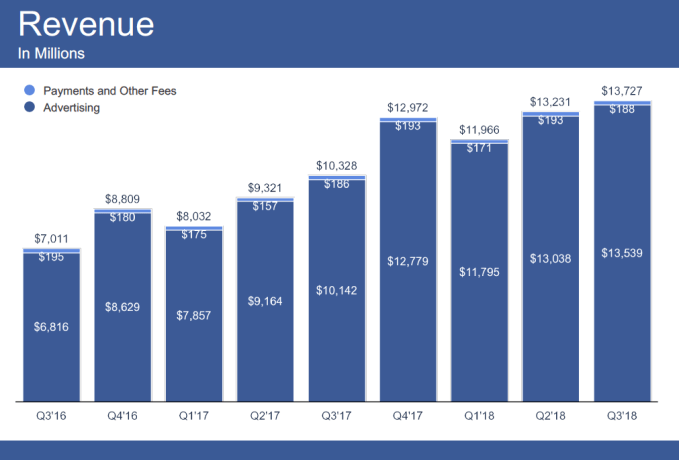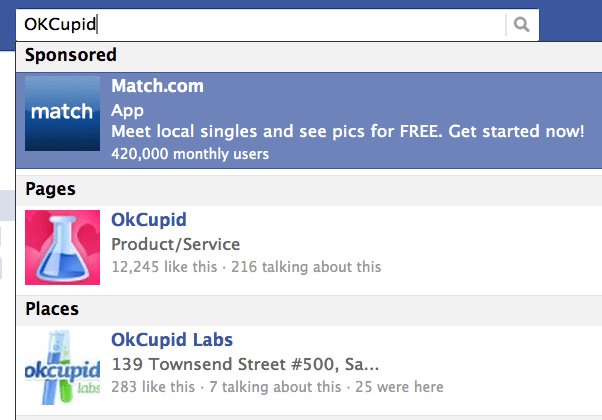Social Media
Facebook relaunches search ads to offset slowing revenue

It’s an ad duoply battle. Facebook is starting to test search ads in its search bar and Marketplace, directly competing with Google’s AdWords. Facebook first tried Sponsored Results back in 2012 but eventually shut down the product in 2013. Now it’s going to let a small set of automotive, retail, and ecommerce industry advertisers show users ads on the search results page on mobile in the US and Canada.
They’ll be repurposed News Feed ads featuring a headline, image, copy text, and a link in the static image or carousel format that can point users to external websites. Facebook declined to share screenshots as it says the exact design is still evolving. Facebook may expand search ads to more countries based on the test’s performance.
The reintroduction of search ads could open an important new revenue stream at a time when Facebook’s revenue growth is quickly decelerating as it runs out of News Feed ad space, the Stories format that advertisers are still adapting is poised to overtake feed sharing on social apps, and users shift their time elsewhere. In Q3 2018, revenue grew 33 percent year-over-year, but that’s far slower than the 49 percent YOY gain it had a year ago, and the 59 percent from Q3 2016. Opening up new ad inventory for search could reinvigorate the sagging revenue growth rate that, combined with Facebook’s privacy and security scandals, has put intense pressure on Facebook’s leaders Mark Zuckerberg and Sheryl Sandberg.

Facebook’s revenue growth rate has slowed significantly over the past two years
“We’re running a small test to place ads in Facebook search results, and we’ll be evaluating whether these ads are beneficial for people and businesses before deciding whether to expand it” Facebook product manager Zoheb Hajiyani to TechCrunch in a statement. The announcement of the search ads comes as Google’s CEO Sundar Pichai is under fire from Congress over data privacy, though the move could help Google look less like it has a monopoly in search. Facebook’s share of the $279.56 billion total worldwide digital ad market will grow to 19.5 percent this year, trailing #1 Google which has 31.5 percent.
Back in 2012, Facebook desperately sought extra revenue streams following its botched IPO. Sponsored Results let game companies, retailers, and more inject links to their Facebook apps, Pages, and posts as ads in the search typeahead results. Since advertisers could target searches for specific other Pages and apps, brands and game developers often tried to swoop in and steal traffic from their competitors. For example, dating app Match.com could target searches for competitor OkCupid and appear above its results. Facebook isn’t allowing advertisers to be quite as cutthroat with this test.

Facebook’s 2012 Sponsored Results ads let competitors swoop on each other’s traffic
With the relaunch, advertisers with access will be able to simply extend their existing Newss Feed ads to the new “Search” placement through the Facebook Ads Manager, similar to how they’d pick Facebook Audience Network or Instagram. No videos ads will be allowed, and search ads won’t appear on desktop. For now, advertisers won’t pick specific keywords to advertise agains, and instead may appear in search terms related to auto or retail topics. Still, the placement will let advertisers dive deeper down the conversion funnel to reach people who might already have intent to buy something and fullfill that demand. Facebook’s News Feed ads (other than those retargeted based on web browsing) are better for demand generation, and sit higher in the funnel reaching users who don’t know what they want yet.
Ads will featured a “Sponsored” tag, and are subject to the same transparency controls around “Why Am I Seeing This?” Facebook plans to evaluate the benefits for users and advertisers in order to determine whether to roll out the ads to more countries and categories. Users will not be able to opt out of seeing search ads. They can “hide” ads using the drop-down arrow as with News Feed ads, but that won’t prevent different ones from showing up in search later.

One major concern is that Facebook already collects as much information as possible about people and their behavior to target its ads. With the reintroduction of search ads, it’s even more incentivized to gather what we do online, what we buy offline, and who we are.
Facebook will have to balance the injection of the ads with remaining an easy way to search for friends, content, businesses and more. Search is far from the core of Facebook’s offering, where users typically browse the News Feed for serendipitous content discovery rather than go looking for something specific. The most common searches are likely for friends’ names which won’t be great ad candidates. But given how accustomed users are to search ads on Google, this new revenue stream could help Facebook boost its numbers without too much disruption to its service.
-

 Business6 days ago
Business6 days agoAPI startup Noname Security nears $500M deal to sell itself to Akamai
-

 Business7 days ago
Business7 days agoUS think tank Heritage Foundation hit by cyberattack
-

 Entertainment6 days ago
Entertainment6 days agoNASA discovered bacteria that wouldn’t die. Now it’s boosting sunscreen.
-

 Entertainment6 days ago
Entertainment6 days agoHow to watch ‘Argylle’: When and where is it streaming?
-

 Business5 days ago
Business5 days agoTesla drops prices, Meta confirms Llama 3 release, and Apple allows emulators in the App Store
-

 Business4 days ago
Business4 days agoTechCrunch Mobility: Cruise robotaxis return and Ford’s BlueCruise comes under scrutiny
-

 Entertainment5 days ago
Entertainment5 days ago‘The Sympathizer’ review: Park Chan-wook’s Vietnam War spy thriller is TV magic
-

 Business3 days ago
Business3 days agoTesla layoffs hit high performers, some departments slashed, sources say




















